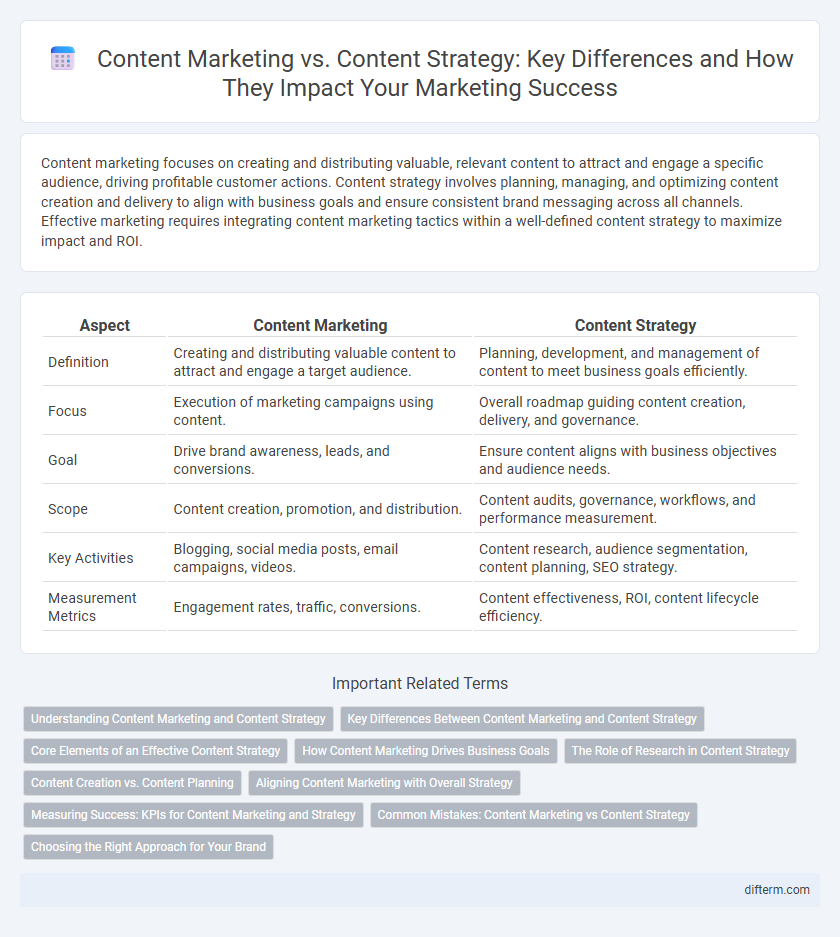Content marketing focuses on creating and distributing valuable, relevant content to attract and engage a specific audience, driving profitable customer actions. Content strategy involves planning, managing, and optimizing content creation and delivery to align with business goals and ensure consistent brand messaging across all channels. Effective marketing requires integrating content marketing tactics within a well-defined content strategy to maximize impact and ROI.
Table of Comparison
| Aspect | Content Marketing | Content Strategy |
|---|---|---|
| Definition | Creating and distributing valuable content to attract and engage a target audience. | Planning, development, and management of content to meet business goals efficiently. |
| Focus | Execution of marketing campaigns using content. | Overall roadmap guiding content creation, delivery, and governance. |
| Goal | Drive brand awareness, leads, and conversions. | Ensure content aligns with business objectives and audience needs. |
| Scope | Content creation, promotion, and distribution. | Content audits, governance, workflows, and performance measurement. |
| Key Activities | Blogging, social media posts, email campaigns, videos. | Content research, audience segmentation, content planning, SEO strategy. |
| Measurement Metrics | Engagement rates, traffic, conversions. | Content effectiveness, ROI, content lifecycle efficiency. |
Understanding Content Marketing and Content Strategy
Content Marketing involves creating and distributing valuable, relevant content to attract and engage a target audience, driving profitable customer actions. Content Strategy, on the other hand, focuses on planning, development, and management of content aligned with business goals and audience needs for long-term success. Understanding the distinction helps marketers optimize resources, enhance brand messaging, and improve overall campaign effectiveness.
Key Differences Between Content Marketing and Content Strategy
Content marketing focuses on the creation and distribution of valuable, relevant content to attract and engage a target audience, driving customer actions and brand awareness. Content strategy involves planning, managing, and optimizing content lifecycle and aligning content goals with broader business objectives to ensure cohesive and effective messaging. The key difference lies in content marketing being execution-oriented, while content strategy is a comprehensive framework guiding the purpose, delivery, and governance of content across channels.
Core Elements of an Effective Content Strategy
Core elements of an effective content strategy include clearly defined audience personas, which guide the creation of relevant and engaging content tailored to target demographics. Thorough content audits and performance analytics inform ongoing adjustments, ensuring alignment with business goals and maximizing ROI. A well-structured editorial calendar orchestrates consistent publishing schedules, enhancing brand visibility and audience retention across distribution channels.
How Content Marketing Drives Business Goals
Content marketing drives business goals by creating and distributing valuable, relevant content that attracts and engages target audiences, ultimately boosting brand awareness and customer loyalty. Effective content marketing enhances SEO, generates qualified leads, and supports conversions, directly impacting revenue growth. Integrating data-driven insights into content marketing ensures alignment with consumer behavior and market trends, maximizing ROI.
The Role of Research in Content Strategy
Research in content strategy plays a critical role in identifying target audience needs, market trends, and competitive gaps, enabling the creation of relevant and engaging content. Unlike content marketing, which focuses on distributing and promoting content, content strategy relies on data-driven insights to guide content planning, development, and optimization. Leveraging analytics, audience behavior, and keyword research ensures that the content produced aligns with business goals and maximizes ROI.
Content Creation vs. Content Planning
Content Creation centers on producing engaging and relevant materials such as blog posts, videos, and social media updates to attract and retain target audiences. Content Planning involves strategically organizing these assets by aligning them with business goals, audience needs, and publishing schedules to maximize impact. Effective marketing requires integrating both processes, ensuring that creative output is guided by a comprehensive strategy to enhance brand visibility and drive conversions.
Aligning Content Marketing with Overall Strategy
Aligning content marketing with overall strategy ensures that every piece of content supports the brand's core objectives, target audience, and key performance indicators (KPIs). Effective integration involves using data-driven insights to tailor content themes, formats, and distribution channels that resonate with customer personas and drive measurable results. This alignment bridges the gap between creative execution and strategic business goals, maximizing return on investment (ROI) and brand consistency.
Measuring Success: KPIs for Content Marketing and Strategy
Measuring success in content marketing requires focusing on KPIs such as engagement rates, conversion rates, and website traffic to assess the effectiveness of content distribution and audience interaction. Content strategy KPIs include audience growth, content efficiency, and alignment with overarching business goals to ensure long-term impact and resource optimization. Both approaches necessitate ongoing analysis of metrics like time on page, social shares, and lead generation to refine tactics and achieve measurable ROI.
Common Mistakes: Content Marketing vs Content Strategy
Confusing content marketing with content strategy often leads to poorly aligned campaigns and wasted resources. Failing to develop a clear content strategy results in inconsistent messaging and ineffective audience targeting, while focusing solely on content marketing without strategic planning diminishes the potential ROI. Marketers must differentiate between these concepts to optimize content creation, distribution, and performance measurement effectively.
Choosing the Right Approach for Your Brand
Content marketing focuses on creating and distributing valuable content to attract and engage a specific audience, driving brand awareness and conversions. Content strategy involves planning, developing, and managing content aligned with business goals, ensuring consistency and efficiency across channels. Choosing the right approach depends on your brand's objectives, resources, and long-term vision to maximize ROI and audience impact.
Content Marketing vs Content Strategy Infographic

 difterm.com
difterm.com